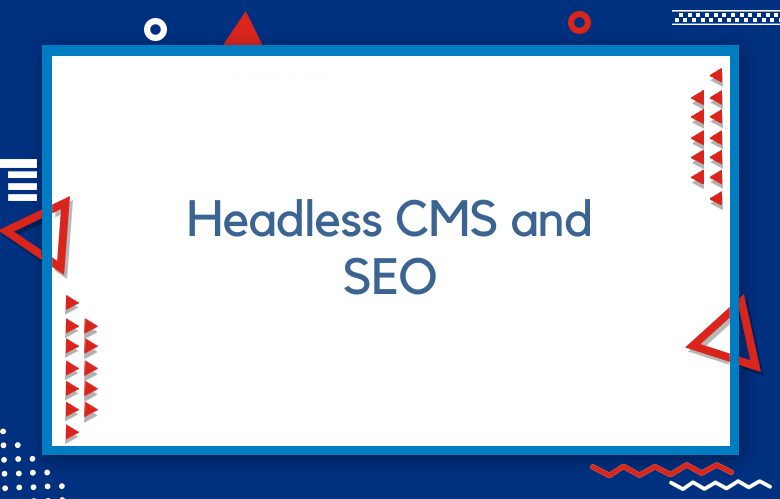Headless CMS and SEO: The Benefits of Using a Headless CMS for SEO Optimization

In today’s digital landscape, having a solid online presence is more important than ever. One of the most critical factors in achieving this is search engine optimization (SEO).
SEO is optimizing your website to rank higher on search engine result pages (SERPs) for relevant keywords. Also important is the content management system (CMS) you use for your website. One emerging trend in the world of CMSs is headless CMSs.
We’ll explore the benefits of using a headless CMS for SEO.
In recent years, content management systems (CMS) have increasingly embraced headless CMS as a viable alternative to traditional CMS.
This new type of CMS architecture separates the front and back ends, giving developers more flexibility in building and managing their web applications. With headless CMS, content creators can focus more on creating content without worrying too much about presentation.
But did you know that headless CMS can also benefit search engine optimization (SEO)? We’ll look closer at the benefits of headless CMS for SEO.
How Can Headless CMS Improve Your Website’s SEO Performance?
Implementing Headless CMS architecture on your website can offer multiple benefits regarding search engine optimization (SEO) performance.
Unlike traditional CMS systems, headless content management systems separate the front-end presentation layer from the back-end content management layer.
This decoupling of website presentation and content storage allows for greater flexibility and control over the website design and better optimization of website content for SEO.
One of the critical advantages of Headless CMS systems is the ability to create content that is “SEO-friendly.” By separating the content from design and presentation, website owners can create a structured content model optimized for search engines.
This allows search engines to better understand a website’s content and helps improve its search engine rankings for relevant queries.
What are the benefits of using a headless CMS for SEO optimization?
A headless content management system (CMS) is a back-end-only CMS that decouples the front-end development from the back-end.
A headless CMS provides all of the benefits of a traditional CMS, such as managing and publishing content quickly while allowing for greater flexibility and customizability on the front end.
One of the primary benefits of using a headless CMS for SEO optimization is that it allows you to create and manage dynamic content quickly.
Dynamic content, such as news articles or product information, changes or is updated regularly.
A headless CMS makes creating and updating dynamic content accessible, as you can change the back end without worrying about affecting the front-end design or code.
This can be a significant advantage regarding SEO, as search engines favor websites that regularly update their content.
In addition, a headless CMS also allows you to easily create and manage multiple versions of your website for different devices or screen sizes.
This is important for SEO as Google now ranks websites based on their mobile-friendliness, meaning that sites not optimized for mobile devices will likely be penalized in search results.
A headless CMS can also provide greater control over your website’s code, which can benefit advanced SEO techniques such as schema markup.
Maximizing SEO with Headless CMS: What You Need to Know?
Search Engine Optimization (SEO) has become integral to digital marketing strategies in recent years.
However, with the evolution of technology, there may be better choices than traditional content management systems (CMS) for maximizing SEO efforts. This is where headless CMS comes into play.
Headless CMS separates the back-end content management and the front-end presentation layer. This offers greater flexibility in designing and implementing a website or application.
Headless CMS can publish content across various channels, including websites, mobile applications, social media platforms, and virtual and augmented reality applications.
Why is Headless CMS the Future of SEO Optimization?
Headless CMS is considered the future of SEO optimization because it provides unmatched flexibility and control over website content.
Unlike traditional CMS solutions that bind content creation and management to website design and functionality, headless CMS separates content from website presentation, allowing developers and content creators to work independently.
The flexibility provided by headless CMS is critical for SEO optimization as it enables businesses to deliver high-quality content to their audience quickly and at scale.
With this CMS architecture, companies can easily manage and publish content across multiple channels, including websites, mobile apps, and social media platforms, while still retaining control over the quality and consistency of the messaging.
Headless CMS vs. Traditional CMS: Which is Better for SEO??
When managing content on a website, there are two primary options: traditional CMS and headless CMS.
Each approach has unique benefits and challenges, and businesses must choose the one that best suits their needs. However, what are the impacts of each type on search engine optimization (SEO)? Let us dive deeper to find out.
Traditional CMS is a content management system that focuses on managing content on a website from a single platform. It is designed to provide a complete solution for website management, including content creation, management, and publication.
Traditional CMS typically has many features, including built-in SEO tools, making it ideal for businesses relying heavily on organic search.
The Impact of Headless CMS on Search Engine Rankings?
As digital content continues to dominate modern marketing strategies, using content management systems (CMS) has become increasingly crucial.
One of the latest trends in the CMS industry is the emergence of headless CMS, which has been gaining popularity among businesses of all sizes. The question that arises is whether or not this innovation can have an impact on search engine rankings.
To begin with, let us first establish what a headless CMS entails. Unlike traditional CMS, headless CMS is designed without a front-end system, meaning that its framework is entirely decoupled from its presentation layer.
This decoupling allows for more flexibility and customization, as content can be more easily repurposed across multiple channels and devices.
How Does Headless CMS Architecture Help Your SEO Strategy?
Headless CMS architecture is famous among website owners who want to improve their search engine optimization (SEO) strategies.
This architecture separates the front-end presentation layer of a website from the back-end content management system (CMS), allowing for a more flexible and efficient SEO approach.
One of the critical benefits of headless CMS architecture is the ability to optimize content for different devices and platforms, including desktops, mobile devices, and social media networks.
The headless CMS provides a centralized content repository that can be easily reused and repurposed across multiple channels, increasing the reach and visibility of your content.
How to Use Headless CMS to Boost Your SEO Rankings?
One of the main advantages of using headless CMS is its ability to boost your website’s SEO rankings.
By providing search engines with high-quality, optimized content, headless CMS can improve your website’s visibility to potential customers and drive more organic traffic to your site. Here are a few ways that headless CMS can help you improve your SEO rankings:
Speed and Performance:
Headless CMS reduces page load by improving server response time, reducing file sizes, and optimizing page rendering. This enhanced speed and performance help search engines crawl your site faster, positively impacting your SEO.
Customization and Flexibility:
Using headless CMS, you can create customized front-end experiences unique to your business, creating a more personalized and relevant experience for your audience.
This customization and flexibility can improve your website’s UX and engagement levels, which helps strengthen your website’s authority and reputation in search engine algorithms.
Multichannel Distribution:
Headless CMS allows you to distribute your content through multiple channels, such as social media platforms, mobile apps, and email campaigns.
This increased visibility across different channels can improve your site’s traffic, enhancing SEO ranking.
Easy Content Optimization:
Headless CMS handles various technical aspects of SEO optimization, such as meta descriptions, alt text in images, page titles, etc.
This takes the burden of technical SEO optimization off your shoulders, freeing you to concentrate more on producing quality content that appeals to your audience and search engines.
In conclusion, headless CMS is a powerful tool that can help boost your website’s SEO rankings through customization, flexibility, optimization, and hassle-free content management.
With more businesses turning to headless CMS as their go-to tool for efficient content management, it’s clear that headless CMS will continue to impact SEO rankings significantly.
Headless CMS and the Future of SEO: What You Need to Know?
In today’s digital age, the success of any online business relies heavily on the effectiveness of its search engine optimization (SEO) strategies.
Companies must adopt innovative and modern solutions to achieve higher search engine rankings. And this is where headless CMS comes in.
A headless CMS is a content management system without a traditional front-end interface. Instead, it stores and delivers content to any device or channel through APIs.
This approach offers flexibility, scalability, and faster website performance. It also enables businesses to keep up with the latest technology trends by allowing them to integrate new technologies and devices easily.
Conclusion:
Headless CMS can offer numerous benefits for SEO. By separating the front end from the back end of your web application, you can improve site speed, flexibility for SEO implementation, mobile responsiveness, and overall user experience.
Incorporating headless CMS into your SEO strategy can help you generate more organic traffic, ultimately leading to more success for your business.
In conclusion, headless CMSs offer many benefits for SEO. Improved site speeds, customization options, efficient content management, mobile optimization, and security contribute to better SEO rankings.
While headless CMSs may not be the right fit for every website, they are an excellent option for modern websites prioritizing SEO and user experience. So, if SEO is a priority for your website, consider using a headless CMS.
Call: +91 9848321284
Email: [email protected]



